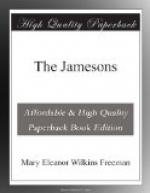“What is it?” said I.
“Well,” said Louisa, hesitatingly, “I was thinking that I supposed—I don’t know that it would work at all—maybe her mother wouldn’t be willing, and maybe she wouldn’t be willing herself—but I was thinking that you were as good a housekeeper as Caroline Liscom, and—you might have the girl in here once in a while and teach her.”
“I will do it,” said I at once,—“if I can, that is.”
I found out that I could. The poor child was only too glad to come to my house and take a few lessons in housekeeping. I waylaid her when she was going past one day, and broached the subject delicately. I said it was a good idea for a young girl to learn as much as she could about keeping a house nice before she had one of her own, and Harriet blushed as red as a rose and thanked me, and arranged to come for her first lesson the very next morning. I got a large gingham apron for her, and we began. I gave her a lesson in bread-making that very day, and found her an apt pupil. I told her that she would make a very good housekeeper—I should not wonder if as good as Mrs. Liscom, who was, I considered, the best in the village; and she blushed again and kissed me.
Louisa and I had been a little worried as to what Mrs. Jameson would say; but we need not have been. Mrs. Jameson was strenuously engaged in uprooting poison-ivy vines, which grew thickly along the walls everywhere in the village. I must say it seemed Scriptural to me, and made me think better in one way of Mrs. Jameson, since it did require considerable heroism.
Luckily, old Martin was one of the few who are exempt from the noxious influence of poison-ivy, and he pulled up the roots with impunity, but I must say without the best success. Poison-ivy is a staunch and persistent thing, and more than a match for Mrs. Jameson. She suffered herself somewhat in the conflict, and went about for some time with her face and hands done up in castor-oil, which we consider a sovereign remedy for poison-ivy. Cobb, too, was more or less a victim to his mother’s zeal for uprooting noxious weeds.
It was directly after the poison-ivy that Mrs. Jameson made what may be considered her grand attempt of the season. All at once she discovered what none of the rest of us had thought of—I suppose we must have been lacking in public feeling not to have done so—that our village had been settled exactly one hundred years ago that very August.
Mrs. Jameson came into our house with the news on the twenty-seventh day of July. She had just found it out in an old book which had been left behind and forgotten in the garret of the Wray house.
“We must have a centennial, of course,” said she magisterially.
Louisa and I stared at her. “A centennial!” said I feebly. I think visions of Philadelphia, and exhibits of the products of the whole world in our fields and cow-pastures, floated through my mind. Centennial had a stupendous sound to me, and Louisa said afterward it had to her.




